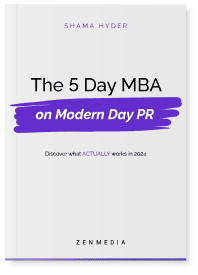Sometimes the first choices we make when we’re young aren’t ones we care to stand by. Like room décor (thinking of you, 2018 neon green shag rug), lifestyle habits, health choices, and time allocation. Oh and here’s another big one worth discussing: career!
There are more and more conversations happening all around us about the power of changing paths—saying “no thank you, this isn’t for me”—and the momentous personal and professional growth that can come from failure. How is it that these conversations are always alive and well? Because, as uncomfortable and upending these experiences in quitting or failure can be, they can also be fiercely empowering, foundational actually, and quite the tale to tell if you can make it through even stronger on the other side.
Being honest with yourself is empowering! And sometimes, if you’re not honest with yourself, the universe has a way of getting honest with you.
So, don’t stay the course if you’re not satisfied. Change your path, change your career, and…change your daily wardrobe?
In my early twenties, I traded my commercial vine growers’ attire (plain faded t-shirts, jeans, ball cap, and hiking boots) for that of a saleswoman, which soon after became also the very transferable wardrobe of a PR professional. My degree is in agriculture, and I’m really proud of it. This outcome is the result of following one of my passions. As I’ve grown, I’ve found that there are new things that excite me, latent interests and talents to explore, and a more developed understanding of how different careers fit into the overall life equation.
While I have enjoyed and valued my past career experiences, I must say there’s an exceptional quality to working in PR. The allure lies in its ability to offer a myriad of diverse career paths, rendering it both captivating and distinctive. It’s a realm where one can harness their creativity, strategic prowess, organizational acumen, and discernment to the fullest. For me, it has been a path to higher fulfillment and actualization of potential.
And though making a big career switch isn’t the most comfortable at the start, it actually isn’t as rare as one might think. In fact, some experts estimate that the average American employee will change between three to seven careers in their lifetimes. Many opt to make these major career changes in their middle-age, however, adults of all ages may be likely to consider it.
If you’re a young professional looking to pivot to PR as I did, these insights are for you. In fact, this is applicable to anyone thinking about making a career change.
First Step: Do Your Research
Studying up and fully understanding what you’re setting out to do is the obvious first step. If a prospective employer in the PR and marketing industry is going to take a chance on you, you need to make sure you have some industry awareness and a foundation in place. There are many avenues: degrees you could pursue, online courses, internships, part-time secondary entry level jobs, independent reading and internet dives (like the Zen Media blog), even hobbies.
This all depends on your bandwidth and how quickly you want to move. The most important thing is to have something you bring to the table which is relevant in the realm of PR and to be humble. For me, these assets were a strong writing ability, adeptness in online research, and the skill to build meaningful client relationships. When you’re starting over in a new industry, you can put much of your prior experience and already honed skills to use, however, you very well might still begin in an entry level position. And that’s fine—this is the best spot to really learn, to make mistakes, and soak it all in.
Second Step: Adjust Your Mindset
Changing careers is far from following the path of least resistance. You’re defying the laws of physics here! In all seriousness, there are risks to your financial, mental, and emotional health when you put yourself on a limb by totally changing what you do for eight hours a day.
With that said, it’s important to keep your mindset positive and do the following:
- Say no to the sunk cost fallacy. According to Harvard Business Review, the sunk cost effect occurs when someone chooses to do or continue something just because they have invested (unrecoverable) resources in it in the past. You should remind yourself that you have a lot of life left to live and you should spend it doing what’s truly fulfilling to you. Be kind to your future self by proactively making adjustments today for a brighter tomorrow.
- Believe in yourself. It’s cliche, I know, but it’s so important. You need to tell yourself that you can and that you are capable until you’ve had that chance to really prove it and beyond.
- Be willing to put yourself out there and be open to new opportunities.
Third Step: Finding a Way In
The next step of course is to try to secure a job in the industry. Well, how do you do that if you don’t have extremely solid experience? You’ll need to LEVERAGE. Here are some specific ways you should leverage:
Leverage Your Network
Find supporters. Be candid with people in your network that you trust and are more comfortable communicating with about the direction you’d like to see your career head in. You might be surprised at who might have a lead for you to follow. Your inner circle is also likely to encourage and motivate you toward taking those next crucial steps and give you the actual momentum you need to make the big switch.
Use LinkedIn, university contacts, and career counseling services to find even more helpful networks. One of the best things I did for my professional development early on was meet with a career counselor. Did you know that a lot of universities offer free post-grad career counseling for alumni? It was through this experience that I learned about industry organization and alumni networks that I hadn’t even considered previously. An experienced career counselor may also be able to offer unique insights into how to penetrate a certain industry or even offer to put you in touch with someone they know through the work they do.
Leverage Your Experience
Don’t sell yourself short by underestimating the value of your previous experiences. My mentor at university told me “all experience is applicable experience.” Basically, there’s growth and value in everything we do professionally. Even if your experiences are not directly related to PR, they could still prepare you and strengthen what you have to offer. When you’re building out your resume, really think about transferable skills that can be applied in your PR career. Things like communication, writing, problem-solving, adaptability, collaboration, the list goes on and on.
You might need to do some work to find open minded employers that value your unique attributes. For me, it was Zen Media. Prior, I’d been in a number of other interviews where it was clear I was written off within the first five minutes due to having a prominent background in another field. This is where it’s going to be really important to put the most relevant information forward and show that you are intentional and passionate about PR. Also, don’t give up. Keep looking, keep interviewing, keep finding ways to leverage your experience and to build your knowledge and experience. Sometimes it takes 50 “nos” to reach a “yes.”
Fourth Step: Thriving
So you have the job. Now how do you become the Olympic diver of PR professionals? Ok or at least keep your head above water?
Take it a day at a time.
PR is fast-paced with a lot of moving parts and oftentimes a lot of big expectations. Depending on the last industry you were in, it may take some adjustment.
Here are the three key ways that I’ve found the most growth:
- Be as organized as possible
This will help you maintain your composure amid the whirlwind of your day-to-day duties, particularly as you find your bearings. Develop habits such as setting up reminders on your calendar for anticipated media releases, blocking off dedicated time for crucial projects, and maintaining a well-structured to-do list. While this advice may seem basic, its significance cannot be overstated. The more you establish effective processes to manage minor tasks, the greater your capacity to focus on and enhance productivity in the more significant endeavors.
- Seek out a mentor among your team members who inspires you.
Engage them in candid conversations about their career journey, what you can anticipate, how you can enhance your performance, and which subsequent projects align with your strengths. Pursue opportunities that enable you to shine and align with your desire to advance uniquely and distinctively within the realm of PR. Doing this will ultimately keep you inspired and on a faster trajectory toward eventual mastery.
- Embrace collaboration and guard against the pitfalls of perfectionism.
Strive to optimize efficiency by collaborating effectively with your team. If your draft is 85% complete, don’t spend extensive hours pushing it across the finish line; instead, leverage your teammate’s fresh perspective to expedite the process. Whenever you encounter challenges or require inspiration, ideas, or direction, don’t hesitate to solicit input and resources from your team. Additionally, make a concerted effort to bolster your team’s capabilities and assimilate by offering your assistance as an extra pair of discerning eyes, aiding in troubleshooting issues, and providing guidance to others as you’re able. A stronger team also makes for a stronger you.
Remember, embracing a new path can lead to a rewarding and successful career in Public Relations. Growth flourishes when you seize opportunities, communicate proactively, and continually pursue knowledge in your chosen field. Embrace the power of change and discover your potential in the world of PR.
Follow Zen on social for more PR industry tips.







